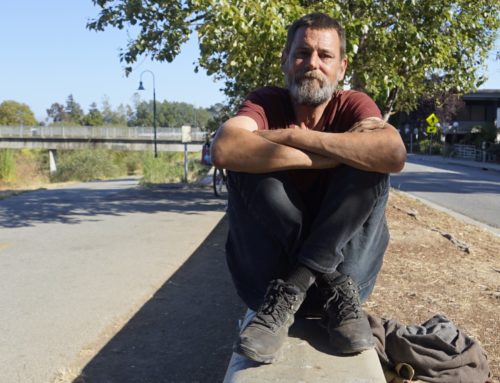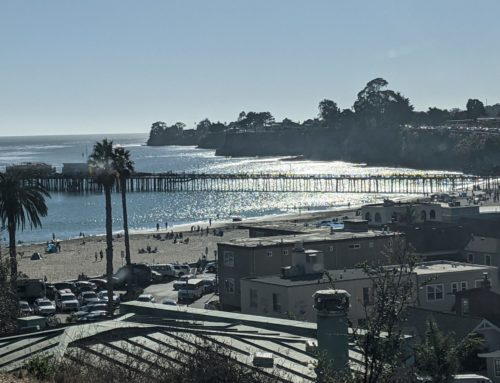Since the start of the Measure M campaign in 2018, one thing has been missing from Santa Cruz’s debate on rent control and eviction rules: data from neutral sources that detail the city’s rental market. Santa Cruz Local wanted to change that.
Stephen Baxter and Kara Meyberg Guzman discuss their findings in the podcast. Click here for the full written report.
TRANSCRIPT
[“Call for data” montage with electronic data-sounding bumper music]
CLIP OF UNIDENTIFIED MALE SPEAKER AT JAN. 8 SANTA CRUZ CITY COUNCIL MEETING: City Council, we’ve heard about the need for data and I think that’s certainly clear, how many evictions, how many – what the real issue is for me, is how high have our good mom and pop landlords raised their rent?
CLIP OF VICE MAYOR JUSTIN CUMMINGS AT SAME COUNCIL MEETING: There’s not a lot of data on how many landlords have been raising their rents, how much they’ve been raising their rents by…
CLIP OF UNIDENTIFIED FEMALE SPEAKER AT SAME MEETING: In the absence of unbiased data I find it would be virtually impossible to measure the effectiveness of any policy modification. Anecdotal information, no matter what the source, should never take the place of empirical data.
STEPHEN BAXTER:Remember Measure M, the ballot measure on rent control that failed in Santa Cruz in November? One thing that made it hard for voters to weigh in on was a lack of data. Data on how many evictions there have been in the city, data on how much landlords have raised rents in recent years and even data on how many rental units there are in the city.
Welcome to Santa Cruz Local, I’m Stephen Baxter.
[MUSIC FADE OUT]
Kara Meyberg Guzman and I set out to find some of that elusive data. The city is in the midst of a year-long housing study that will include a new task force. It’s supposed to give data-driven policy recommendations to the city on how to protect tenants and landlords. But a year is a long time to wait, so we thought we’d get a head start by finding and interpreting some data that the city and county already have.
We put up a full written report on our website, Santa Cruz Local . org, but we thought we’d give you taste here.
So Kara, let’s start with the city. Where’s the city right now with its search for housing and rental data?
KARA MEYBERG GUZMAN: OK so, as you may remember from our previous episodes, the City of Santa Cruz right now forming a task force to try to find a plan for tenant protections, after Measure M failed at the ballot last year. Measure M would have put some restrictions on landlords. Like who and when landlords could evict, and it also would have capped how much some rents could be increased each year.
Measure M was this huge polarizing thing for the city, and in some ways, the battle lines are still drawn between landlords and tenants. It didn’t pass, and instead we’re going to have this task force that will take a “data driven approach.” They’re going to decide what data to collect.
City staffers have presented this whole list of data that the task force could look at, like rent prices and evictions. This week, a city staffer told me they haven’t actually started tackling that list of data — they’re going to wait until the task force gives them direction. So basically, all the city has right now is a list of possible sources for data.
SB: So, for our story, tell us about the data you were looking for.
KMG: Well we had three goals:
- Number 1, find out how many rentals the city has and to track trends over the last few years
- Number 2, to fact check some claims that Realtors made that rentals have been lost from the market due to the Measure M campaign
- Number 3, find trends in the number of evictions in the city.
We had four sources: the Santa Cruz County Assessor’s Office, the city of Santa Cruz’s Residential Rental Inspection Program, the Superior Court of Santa Cruz County and some real estate info from the Realtors database, MLS.
SB: What did you find?
KMG: From the limited eviction data we had for the city, court-ordered evictions have decreased in each of the last three years.
SB: OK.
Also, from the city’s rough numbers on how many rentals there are, there are fewer rentals available in the city now than there were in 2017.
Also, we were able to produce some maps that showed how the city’s rental market has shifted geographically in the past few years. We’ve illustrated where rentals have been added and taken away from the rental market — and also where there have been sales of rental units.
But my big takeaway is that there’s a real need for more precise tracking of the Santa Cruz rental market. A lot of it could be accomplished by adding some questions to the city of Santa Cruz rental inspection questionnaire. Things like, rent prices, number of tenants in a rental and tenant turnover.
All the sources we looked at had major shortcomings. There isn’t a central place to find good data on rent increases, tenant notices to vacate and numbers of current rentals and rentals sold. We couldn’t draw any other major conclusions about shifts in the city’s rental market in the last few years.
To get into the details a little, we got a list of all the sales in the city over the last few years. We also got the city’s rental inspection list, which gives us an approximation of all the registered rentals in the city.
Then we were able to merge those lists with the help of Rich Westfall, the GIS manager for the City of Santa Cruz who creates maps that beautifully illustrate complex data. Shout out to Rich.
SB: And you can see those maps on our website, santacruzlocal.org. Another big thanks to our new graphic artist Haley Williams, who created the charts for the story.
KMG: Yup. So what those maps showed us was a rough approximation of all the rental units that sold in 2017, before the Measure M campaign got underway, and all the rentals units that sold in 2018, during the thick of the campaign.
So you can get into the details more in the written story. I really think this a story best told visually, so please check out our website at santacruzlocal.org.
[MUSIC FADE IN]
SB: For those of you who are joining us for the first time, Santa Cruz Local is a local news startup co-founded by Kara Meyberg Guzman and me, Stephen Baxter.
We cover Santa Cruz city council meetings when they happen every other Tuesday. Those episodes are available the same night of the meeting wherever you get your podcasts. We’re also covering broader topics such as housing, development and homelessness in Santa Cruz.
We’re also starting a movement. We believe that the more people who watch and are engaged in our local institutions, the more everyone’s needs are addressed, the better democracy works and the stronger our community. Please join us. You can sign up for our email newsletter at SantaCruzLocal DOT org, and stay tuned for updates on our official launch.
Also, we wanted to ask you for a favor. If you’re listening to us right now on Apple Podcasts, can you press “subscribe” and give us a rating? We think that will help us build our audience.
OK, that’s it for this episode.
[MUSIC FADE OUT]
Stephen Baxter is a co-founder and editor of Santa Cruz Local. He covers Santa Cruz County government.
Kara Meyberg Guzman is the CEO and co-founder of Santa Cruz Local. Prior to Santa Cruz Local, she served as the Santa Cruz Sentinel’s managing editor. She has a biology degree from Stanford University and lives in Santa Cruz.






